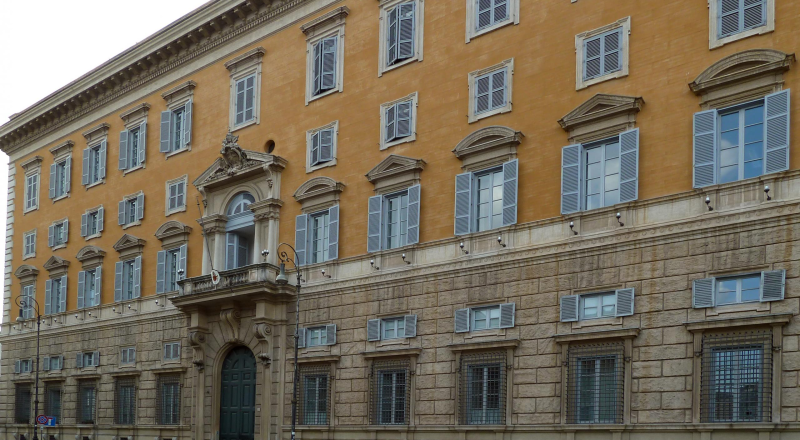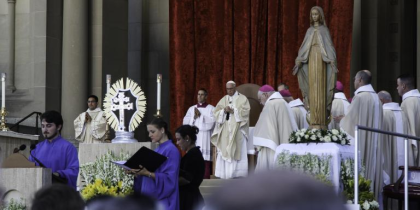This morning Pope Francis released Laudate Deum, which is a follow-up to Laudato Si’. The document has a large part on specifics about climate and international conferences that don’t affect the average person as much. You or I can’t change the international agreements on climate change. After I read Laudate Deum, I collected some quotes I thought might be helpful for average Catholics to understand it better. This will present them in the same order as the document.
Dignity, Not Just Ecology

Near the beginning, Francis notes this connection in paragraph 3:
This [ecological issues] is a global social issue and one intimately related to the dignity of human life. The Bishops of the United States have expressed very well this social meaning of our concern about climate change, which goes beyond a merely ecological approach, because “our care for one another and our care for the earth are intimately bound together. Climate change is one of the principal challenges facing society and the global community. The effects of climate change are borne by the most vulnerable people, whether at home or around the world”.
Don’t Blame the Poor
Paragraph 9 notes how it is us in rich countries who are more responsible:
In an attempt to simplify reality, there are those who would place responsibility on the poor, since they have many children, and even attempt to resolve the problem by mutilating women in less developed countries. As usual, it would seem that everything is the fault of the poor. Yet the reality is that a low, richer percentage of the planet contaminates more than the poorest 50% of the total world population, and that per capita emissions of the richer countries are much greater than those of the poorer ones.
This is also a critique of sterilization & abortion programs put on poorer countries by richer ones like the USA & Canada.
A Broad Summary
Francis notes, “It is no longer possible to doubt the human –’anthropic’ – origin of climate change,” in paragraph 11 & follows this with some scientific data.
In paragraphs 15 & 16 of Laudate Deum, he continues, “Some effects of the climate crisis are already irreversible, at least for several hundred years, such as the increase in the global temperature of the oceans, their acidification and the decrease of oxygen. […] The same can be said about the decrease in the continental ice sheets.”
Rethinking Human Power
Francis uses an analogy to nuclear weapons to note not every human power is a good thing (paragraph 24):
Not every increase in power represents progress for humanity. We need only think of the “admirable” technologies that were employed to decimate populations, drop atomic bombs and annihilate ethnic groups. There were historical moments where our admiration at progress blinded us to the horror of its consequences… It is not strange that so great a power in such hands is capable of destroying life, while the mentality proper to the technocratic paradigm blinds us and does not permit us to see this extremely grave problem of present-day humanity.
A Possible Error Regarding Nuclear Power
Pope Francis seems to take a rather one-sided view on nuclear waste form power plants. Nuclear waste from bombs can be a huge issue, but nuclear waste from power plants properly encased is presented as relatively harmless to human health or the environment. I have not researched enough to be sure, but a more cautious tone seems appropriate. Many of us think of Three Mile Island as an example of a horrible environmental disaster killing many, and making the nearby environment unliveable. However, the Nuclear Energy Institute (NEI) states, “caused no injuries or deaths. In addition, experts concluded that the amount of radiation released into the atmosphere was too small to result in discernible direct health effects to the population in the vicinity of the plant. More than a dozen epidemiological studies conducted since 1981 have borne this out.” I also rode my bike along the road just across the river from it and the environment there seemed perfectly fine
However, Francis states in paragraph 30 of Laudate Deum:
One need but think of the momentary excitement raised by the money received in exchange for the deposit of nuclear waste in a certain place. The house that one could have bought with that money has turned into a grave due to the diseases that were then unleashed. And I am not saying this, moved by a overflowing imagination, but on the basis of something we have seen. It could be said that this is an extreme example, but in these cases there is no room for speaking of “lesser” damages, for it is precisely the amassing of damages considered tolerable that has brought us to the situation in which we now find ourselves.
It is interesting that this paragraph has no citations. If it was so widely known this is “something we have seen,” surely, plenty of examples can be shown. But I know of none where nuclear waste was dealt with using modern methods “has turned into a grave due to the diseases that were then unleashed.”
This is important as nuclear power is necessary if we want to achieve the other goals set out. Sure wind, solar & hydro can provide some power, but it’s unlikely they will provide enough in the next 25 years to reach climate goals Francis is promoting without building nuclear power plants. Demonizing nuclear might go against the wider goals of Laudate Deum. as even if the risks are more serious than the NEI says, it still seems significantly less dangerous to the environment per megawatt hour than any electricity provided by burning fossil fuels.
Spiritual Motivations
Two paragraphs near the end provide us with some spiritual motivation.
62. The Bible tells us: “God saw everything that he had made, and indeed, it was very good” ( Gen 1:31). His is “the earth with all that is in it” ( Deut 10:14). For this reason, he tells us that, “the land shall not be sold in perpetuity, for the land is mine; with me you are but aliens and tenants” ( Lev 25:23). Hence, “responsibility for God’s earth means that human beings, endowed with intelligence, must respect the laws of nature and the delicate equilibria existing between the creatures of this world”. […]
64. Jesus “was able to invite others to be attentive to the beauty that there is in the world because he himself was in constant touch with nature, lending it an attraction full of fondness and wonder. As he made his way throughout the land, he often stopped to contemplate the beauty sown by his Father, and invited his disciples to perceive a divine message in things”.
An Exhortation to Use Less
Laudate Deum ends with an exhortation to use less. Paragraph 71 praises simple efforts & paragraph 72 notes differences in emissions.
71. Efforts by households to reduce pollution and waste, and to consume with prudence, are creating a new culture. The mere fact that personal, family and community habits are changing is contributing to greater concern about the unfulfilled responsibilities of the political sectors and indignation at the lack of interest shown by the powerful. Let us realize, then, that even though this does not immediately produce a notable effect from the quantitative standpoint, we are helping to bring about large processes of transformation rising from deep within society.
72. If we consider that emissions per individual in the United States are about two times greater than those of individuals living in China, and about seven times greater than the average of the poorest countries.
Some have interpreted 72 as a dig at the USA. I don’t think it is directly. The point is that different countries use different amounts of hydrocarbons per capita. The US tops that list whether you like it or not. It is simply noting this. Pope Francis is not always talking to Americans, despite what many think. I think it would have been good to note the degree outflow from smokestacks & into rivers are cleaned as many of the negative effects can be somewhat mitigated by that. I think the USA is much better than China at this, so although we produce more CO2 per person, we don’t pollute rivers & clean out more toxic chemicals in the air.
Conclusion
Laudate Deum is a good follow-up to Laudato Si’. As much of it is about stuff well beyond the average person, I’m not sure what many of us can do. One issue it does have is a paragraph that seems to unjustly put a negative light on nuclear power when nuclear power is likely part of the solution to climate change, not the cause of it.









